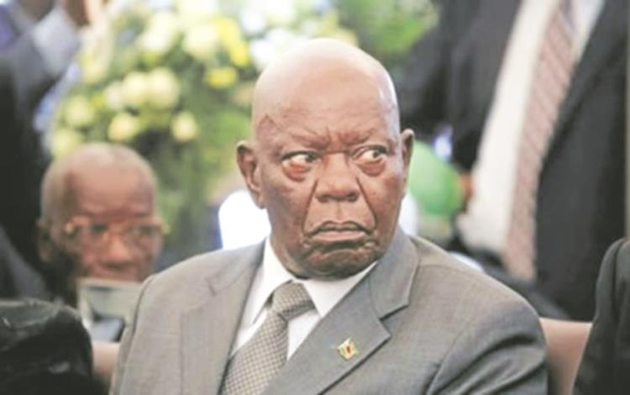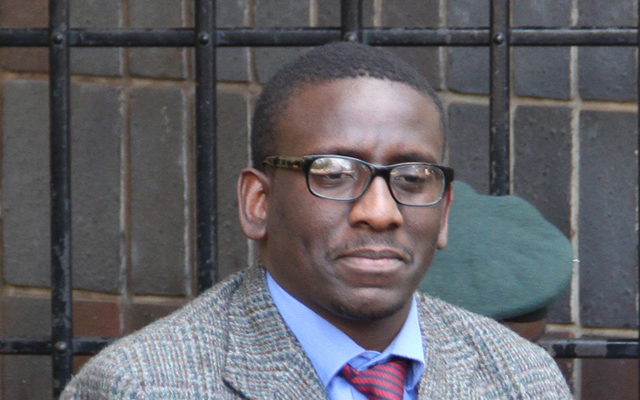Tragedy of presumptuous ambitions

Reason Wafawarova On Thursday
THE decision to become a Head of State and Government must be one made under a very definite set of circumstances, not some thoughtless audacity driven by blind insatiableness.
Not only have the declared and undeclared ambitions of former Vice President Joice Mujuru led to a dramatic collapse of a 41-year-old political career, but with that collapse we have also seen a thunderous internal shaking within Zanu-PF’s power corridors, with a sizeable number of politicians abruptly coming face-to-face with the sun-setting of what had appeared to be invincible political careers.
It is hard to believe people like Didymus Mutasa will in the future bounce back as a de-facto “leader of Manicaland,” to borrow from Temba Mliswa, himself part of the disgraced fallen cabal.
There have to be events and moments in life where one has to have a phenomenal encounter with the people, and only a historical background of this nature can amount to a copacetic foundation good enough for national leadership.
Cronyism and factional machinations do not suffice to qualify one for the role of head of state, as the dramatic turn of events in Zanu-PF have just proven.
Anyone aspiring to occupy the position of head of state and government must go back long way into the past, and they must convince themselves that in that past they have had a meaningful relationship with the people.
One does not just wake up with a decision to become the head of state and government, unless that person is nit-witted enough to believe in the power of daydreams.
Myths of grandeur like what Arthur Mutambara and Simba Makoni had will only end in shame and humiliation if such myths lack the grassroots grounding connecting the mythical character to the generality of the people.
One does not just decide to become a Head of State and Government.
What one decides to do is to put an end to this or that form of vexation afflicting the people, to fight down exploitation, harassment or some form of domination.
In short, one has to stand for a cause that resonates well with the aspirations of the people, and only such a cause will make people accept one’s decision to offer themselves as a candidate for the office of head of state.
Ideology is all about conviction, like a survivor of an Ebola attack going back to dedicate all his life towards nursing Ebola patients or researching for a vaccine.
If that person in the end becomes an eminent leading figure in the fight against the disease, or a head of something in the health profession, the position of eminence does not necessarily define their character.
What defines that person’s character is the driving ideology behind their convictions.
Alongside other eminent nationalists Cde Robert Mugabe joined the nationalist movement in the early 60s, and these founding fathers were driven by the passion to end colonial harassment and oppression.
In 1975 an imperative need among the cadres resulted in all others settling for Robert Mugabe to lead both Zanu and its military wing Zanla, this coming at a critical time where a series of tragic events seemed to be stalling the war effort.
These founding fathers of this era were nationalist cadres that started out with a clear conviction.
They understood clearly what they were fighting against, and so did they know what they were fighting for.
One’s fight in politics cannot be successful unless one is convinced that the fight itself is just.
Self-centred political ambition cannot constitute a just cause; and this is why many aspirants to the position of Head of State and Government have fallen by the wayside.
When one wages a struggle as a pretext or a lever to acquire power, generally their efforts will end in defeat and shame, and this is precisely why the so-called pro democracy movement in Zimbabwe has degenerated to meaningless flakes, with Morgan Tsvangirai increasingly becoming a wimp on the political landscape.
Waging a struggle in order to create a pretext for acquiring power will only result in the mask cracking sooner than one can say head of state, and perhaps factionists within Zanu-PF should have known better than seeking power for the sack of it, engaging in clandestine gangsterism without identifying themselves with a defined cause, not even the declared credo of the party itself.
You do not get involved in a revolution in order to become head of state and government.
What you do is to fight for the just cause behind the revolution, stand on principle, and show unwavering commitment towards the good of everyone.
It is the need to organise that leads to a need for someone in a certain place.
The need to organise leads to the identifying of persons and characters with an endowed capacity to lead, and this is how genuine leadership rises.
After Chairman Herbert Chitepo tragically died in March 1975, there arose a need for someone to organise the direction and course of the liberation struggle, and the comrades of the day identified in Robert Mugabe a capable leader, and today, 39 years later, the man still renders to his party that organisational function.
It is not too difficult to identify the man’s ideological identity, or to know that the man stands on principle, whether one agrees or not with those principles.
But why Robert Mugabe, and not others?
The man has always proven that he is capable of fighting, that he is courageous enough to fight not only for himself, but also for what his party stands for — in the view of party members a national cause.
The Zanu-PF leader has always shown sufficient will to fight for others, and perhaps this is one characteristic that has always endeared the man to his party’s grassroots.
From his contribution to the war itself, to the post-independence developmental programs like mass education, to the land reforms, and now the indigenisation policy, the man has just been consistent and unwavering, even with relentless opposing forces coming his way.
There are many in Zanu-PF who know how to wage a fight, and some of them are excellent fighters who doubtlessly know how to go about it.
The problem is that most of them do it purely for themselves, and for that reason they do not get too far.
For one to become a head of state and government through a party like Zanu-PF there is need for that person to have natural roots, and that means a natural connection with the aspirations of the general membership of that party, a tie to their needs and wants.
It appears like there are some in Zanu-PF’s internal power struggles who have tried to artificially create roots for themselves — manipulating the structures of the party in order to create a wall around themselves.
Obviously such people are cut off from the masses, and this is why it has been significantly easy for such people to be thwarted.
Such people can be generous at times, but they are not necessarily revolutionaries.
So you have politicians who work hard, but they are not happy because they realise no one seems to understand them, even if they have proven prolific proficiency in discharging their duties.
We have one or two Cabinet Ministers who have been making honest sacrifices since they were appointed in September 2013.
Walter Mzembi is one of them, but he is a worried man because no one seems to understand what the man is doing, especially people who should matter most to him, his own constituency.
Sincerity on its own does not connect one to the hearts of people.
One has to stand on principle and ideology, speak one language with the rest of the revolutionary masses; otherwise one’s sincerity could easily be mistaken for alienating behaviour.
The frustration of getting rejected despite your hard work and commitment is a very disheartening experience.
It is like the international aid workers that mean so well, and they sincerely come all the way from Europe believing that theirs is a mission to make Africa a better place for its people.
Their limited knowledge about Africa will naturally lead to them making some mistakes, and their projects sometimes dramatically fail.
They then make wrong conclusions about Africa; go back home totally frustrated and disgusted.
Their frustration is not necessarily because of lack of a noble heart, but perhaps a result of unintended patronising behaviour.
This is why the hard working and well meaning Walter Mzembi got humiliated by an unknown villager when his district held Central Committee elections, fortunately to be rescued by a presidential appointment at the party’s Congress.
There is need to identify with the party’s ideological principles, and to actively prove that one can organise towards the furtherance of those principles.
A leader must immerse himself or herself in the masses, and from the masses any true leader will derive their energy. When one is immersed in the masses they understand the problems affecting the people, and they can bring about viable solutions for the majority of the people. Their grasp of society’s problems is not a product of university studies in the sociology department.
The reason our lawyer politicians like Tendai Biti and Welshman Ncube cannot transform their fine intelligentsia into meaningful solutions to the problems affecting the masses is because they think the law school taught them enough to be little defence lawyers for every single one of us, always thinking on our collective behalf.
That behaviour repulses the masses, and that is why it is hard for such politicians to command a popular vote.
When we see our leading politicians sometimes we get the impression that we are looking at serious people, but a slight stint with them will most of the time end not so well.
You soon realise they are nothing but rats in the political playing field; doing nothing more than play clever complicity to the problems bedevilling the masses.
They all seem to enjoy this kind of acquiescence that reduces all our problems to some verbal and theoretical sparring match.
That is why I am not a big fan of politicians that wave Zim-Asset in my face each time I want an answer for the economic challenges bedevilling the country.
They love to hear their own voices in Parliament, and they pride in articulating themselves pompously well as they read the ever-impressive speeches, trotting from one public function to the next.
These are people who are contented driving around in flashy government vehicles wearing designer suits, and striding in a fashion that speaks unquestionable self-actualisation.
We hope the new look Zanu-PF leadership will be committed enough to turn around the waning fortunes of our economy.
That is all the people are looking for.
Zimbabwe we are one and together we will overcome. It is homeland or death!
- Reason Wafawearova is a political writer based in Sydney, Australia.







Comments